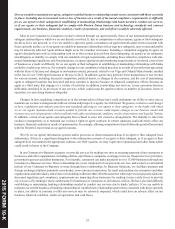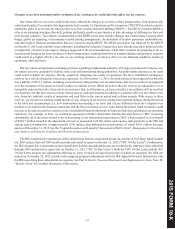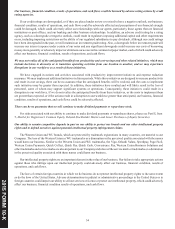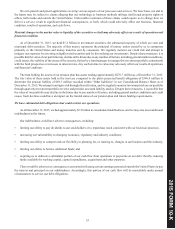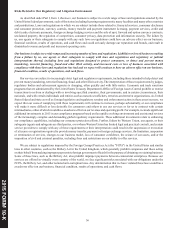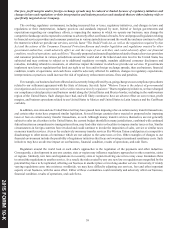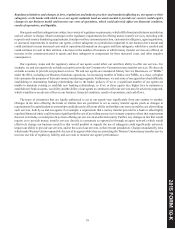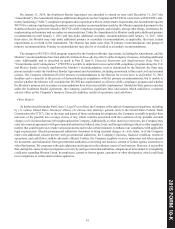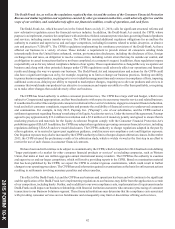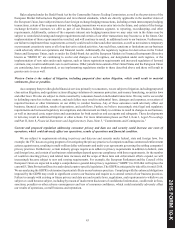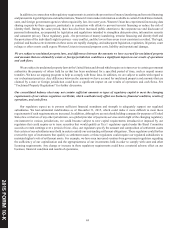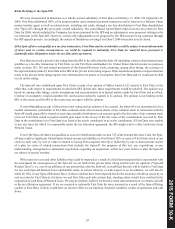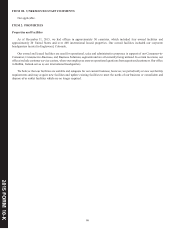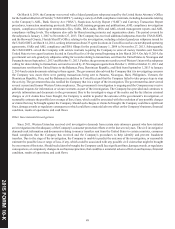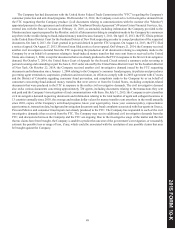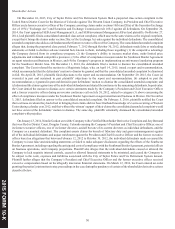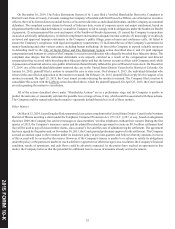Western Union 2015 Annual Report Download - page 144
Download and view the complete annual report
Please find page 144 of the 2015 Western Union annual report below. You can navigate through the pages in the report by either clicking on the pages listed below, or by using the keyword search tool below to find specific information within the annual report.
42
The Dodd-Frank Act, as well as the regulations required by that Act and the actions of the Consumer Financial Protection
Bureau and similar legislation and regulations enacted by other government authorities, could adversely affect us and the
scope of our activities, and could adversely affect our financial condition, results of operations, and cash flows.
The Dodd-Frank Act, which became law in the United States on July 21, 2010, calls for significant structural reforms and
new substantive regulation across the financial services industry. In addition, the Dodd-Frank Act created the CFPB, whose
purpose is to implement, examine for compliance with and enforce federal consumer protection laws governing financial products
and services, including money transfer services. The CFPB has created additional regulatory obligations for us and has the
authority to examine and supervise us and our larger competitors, including for matters related to unfair, deceptive, or abusive
acts and practices ("UDAAP"). The CFPB's regulations implementing the remittance provisions of the Dodd-Frank Act have
affected our business in a variety of areas. These include: a requirement to provide almost all consumers sending funds
internationally from the United States enhanced, written, pre-transaction disclosures, including the disclosure of fees, foreign
exchange rates and taxes, an obligation to resolve various errors, including certain errors that may be outside our control, and
an obligation to cancel transactions that have not been completed at a consumer's request. In addition, these regulations impose
responsibility on us for any related compliance failures of our agents. These requirements have changed the way we operate our
business and along with other potential changes under CFPB regulations could adversely affect our operations and financial
results and change the way we operate our business. The Dodd-Frank Act and interpretations and actions by the CFPB could
also have a significant impact on us by, for example, requiring us to limit or change our business practices, limiting our ability
to pursue business opportunities, requiring us to invest valuable management time and resources in compliance efforts, imposing
additional costs on us, delaying our ability to respond to marketplace changes, requiring us to alter our products and services in
a manner that would make our products less attractive to consumers and impair our ability to offer them profitably, or requiring
us to make other changes that could adversely affect our business.
The CFPB has broad authority to enforce consumer protection laws. The CFPB has a large staff and budget, which is not
subject to Congressional appropriation, and has broad authority with respect to our money transfer service and related business.
It is authorized to collect fines and provide consumer restitution in the event of violations, engage in consumer financial education,
track and solicit consumer complaints, request data and promote the availability of financial services to underserved consumers
and communities. For example, in July 2015, Paymap, Inc. ("Paymap"), one of our subsidiaries, and the CFPB reached a
settlement agreement regarding Paymap’s marketing of its Equity Accelerator service. Under the terms of the agreement, Paymap
agreed to pay approximately $33.4 million in restitution and a $5.0 million civil monetary penalty and agreed to ensure that its
marketing practices and materials for the Equity Accelerator Program comply with the Consumer Financial Protection Act's
prohibition against UDAAP. In addition, the CFPB may adopt other regulations governing consumer financial services, including
regulations defining UDAAP, and new model disclosures. The CFPB's authority to change regulations adopted in the past by
other regulators, or to rescind or ignore past regulatory guidance, could increase our compliance costs and litigation exposure.
Our litigation exposure may also be increased by the CFPB's authority to limit or ban pre-dispute arbitration clauses. In December
2013, the CFPB released the preliminary results of its arbitration study, which is widely viewed as the first step in an effort to
restrict the use of such clauses in consumer financial contracts.
We have been and will continue to be subject to examination by the CFPB, which in September 2014 finalized a rule defining
"larger participants of a market for other consumer financial products or services" as including companies, such as Western
Union, that make at least one million aggregate annual international money transfers. The CFPB has the authority to examine
and supervise us and our larger competitors, which will involve providing reports to the CFPB. Based on examination material
that has been published by the CFPB, we expect the CFPB to conduct rigorous examinations, which could result in further
changes to our operating procedures. The CFPB has used information gained in examinations as the basis for enforcement actions
resulting in settlements involving monetary penalties and other remedies.
The effect of the Dodd-Frank Act and the CFPB on our business and operations has been and will continue to be significant
and the application of the Dodd-Frank Act's implementing regulations to our business may differ from the application to certain
of our competitors, including banks. Further, and in addition to our own compliance costs, implementation of requirements under
Dodd-Frank could impact our business relationships with financial institution customers who outsource processing of consumer
transactions to our Business Solutions segment. These financial institutions may determine that the compliance costs associated
with providing consumer services are too burdensome and consequently may limit or discontinue offering such services.
201 FORM 10-K
5


